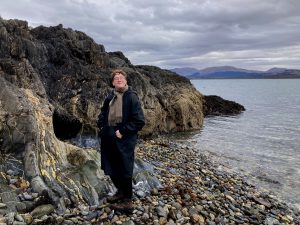Listen to the podcast episode or download the transcript.
Show notes by James Stevenson, ATA podcast intern
In this latest episode, Rachel sits down with Ellis Fannin, a PhD researcher at Manchester University whose PhD title is “Queering Cartographic Methods.”
They discuss the importance of queer theory in mapping and the role of the researcher in queer geographies. Queer theory is a body of academic work that challenges the idea of a fixed or essential identity. Queer theory argues that identity is fluid and constantly changing. Ellis cites Queering the Map as an initial investigation into queer geographies and cartographies.

Ellis expands further explaining that this has important implications for mapping, as it suggests that maps should not be seen as static representations of space, but rather as dynamic tools that can be used to explore and challenge the ways in which we understand and experience space.
Emotions too are often overlooked in geographical research, but they are essential to understanding queer experiences of space. For example, queer people may feel a sense of belonging in certain spaces, while they may feel excluded from others. These emotional experiences can profoundly impact how queer people use and interact with space.
Rachel asks why Glasgow? Ellis explains the sense of community that Glasgow had to offer was very appealing. They go on to say that with queer subjects, there is a lot of focus on Brighton, London, and Manchester, which are very interesting places with interesting queer scenes and communities. In Glasgow, meeting people, even just seeing people in the park that sort of looked like me. The outside areas within Glasgow, like parks can become queer-focused areas, Ellis explains, ‘Trees don’t judge’ and as you walk around the park you begin to see people like you, or recognise from a certain area or a pub or another queer space, therefore the green space like a park, can become queer-friendly.
Ellis began researching in 2021, during the height of the Covid pandemic, they explain that despite the pandemic, they had to work outside the more conventional ways of conducting research, not in a workshop room or environment, bringing lots of people together, and so there started a the beginning of the idea of walking and the participants taking Ellis out on their walks, and giving a total agency to the participant to gather the data. This was a ‘silver lining’ in the pandemic world for Ellis, as they began to conduct research firstly making call outs for participants within the Glasgow area, harnessing the power of social media and friends. They conducted 25 walks, using microphones, along with disposable cameras that the participants were encouraged to use to capture any site of interest as a record of their journey. Ellis mapped the walks they took with research participants on Strava, with the walks themselves then becoming maps of queer space and place. They hope in the future to create an exhibition of the research and the artefacts obtained during the research.
Queering cartographic methods can help challenge the heteronormative assumptions that often underpin mapping. By queering cartographic methods, we can uncover the more-than-representational power of the map-making process and generate queer geographies that take into account complex mobilities, rhythms, and emotions.
References
Ahmed, S (2006) Queer Phenomenology. Duke University Press.
Barad, K (2008) Queer Causation and the Ethics of Mattering. Routledge.
Further Links and Notes
https://www.queeringthemap.com/ – Queering the Map is a community-generated counter-mapping platform for digitally archiving LGBTQ2IA+ experience in relation to physical space.
Judith Butler is an American philosopher and writer who has greatly impacted political philosophy, ethics, third-wave feminism, queer theory, and literary theory.
OUT on Sundays is an LGBTQI+ walking group for city-based people of all sporting abilities who can benefit from the social aspect. Glasgow.
Saskia Warren is a Lecturer in Human Geography at the University of Manchester and is the author of ‘Pluralising the Walking Interview: Researching (Im)mobilities with Muslim Women (2017).
Strava is an app for tracking physical exercise which incorporates social network features. It is mostly used for cycling and running using Global Positioning System data.
- School Streets: ATA podcast 2024:2 - July 1, 2024
- Accessibility and Urban Design: ATA podcast 2024:1 - January 25, 2024
- Queering Cartographic Methods: ATA podcast 2023:4 - July 6, 2023